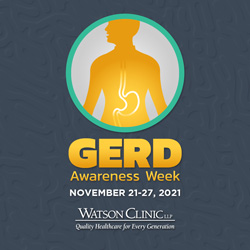 Heartburn happens. But if it happens too frequently, you might have a more serious condition called gastroesophageal reflux disease or GERD.
Heartburn happens. But if it happens too frequently, you might have a more serious condition called gastroesophageal reflux disease or GERD.
With GERD, that burning feeling in the chest and throat typically occurs two or more times a week. It happens when stomach acids rise up into the esophagus. Over time, severe GERD may damage the esophagus, which can increase the risk of cancer. So if you have ongoing heartburn, it's important to tell your doctor.
If your doctor discovers the presence of GERD, they may recommend some of the following treatments to help you control it.
• Weight loss if needed.
• Avoiding heartburn triggers, such as acidic, greasy or spicy foods or alcoholic drinks.
• Quitting smoking.
• Avoiding tight clothing that can force stomach acids upward.
• Avoiding eating within three hours of bedtime.
• Placing blocks under your bedposts to raise the head of your bed.
Doctors often recommend over-the-counter antacids at first, but other medicines may be needed to block or decrease stomach acids as well, including:
• H2 blockers for short-term relief.
• Proton pump inhibitors for long-term relief.
In severe cases of GERD, surgery may be used to help reinforce the muscles that normally keep stomach acid where it belongs.
Your Watson Clinic primary care physician and gastroenterologist can help you properly diagnose GERD, and offer treatments to properly manage the disease. Meanwhile, Watson Clinic general surgeons have a wealth of experience in treating GERD using minimally invasive surgical techniques.
Source: National Institutes of Health